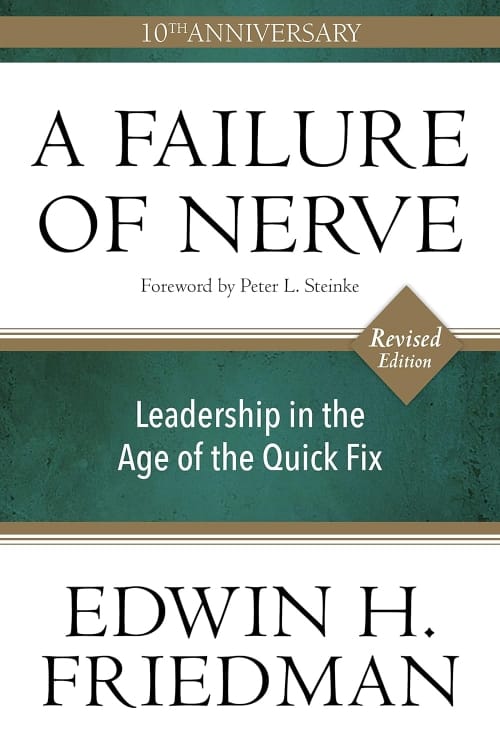The Best Leadership Book You Haven’t Read

If you’re like me, you have a love-hate relationship with leadership books. I believe leadership is important, but I’m frustrated by the hype and technique-driven leadership material out there. So I’m somewhat skeptical when it comes to leadership books.
A few weeks ago my friend Barry Parker (rector of St. Paul’s Bloor Street in Toronto) told me that he has around 150 books on leadership, and the best one he’s read is A Failure of Nerve by Edwin H. Friedman. I ordered the book and found it to be very helpful.

The book is based on the Bowen systems theory of the family. As Wikipedia puts it:
To have a well-differentiated “self” is an ideal that no one realizes perfectly. They recognize that they need others, but they depend less on other’s acceptance and approval. They do not merely adopt the attitude of those around them but acquire their principles thoughtfully. These help them decide important family and social issues, and resist the feelings of the moment. Thus, despite conflict, criticism, and rejection they can stay calm and clear headed enough to distinguish thinking rooted in a careful assessment of the facts from thinking clouded by emotion. What they decide and say matches what they do. When they act in the best interests of the group, they choose thoughtfully, not because they are caving in to relationship pressures. Confident in their own thinking, they can either support another’s view without becoming wishy-washy or reject another’s view without becoming hostile.
If you’re leading in a church or organization that’s experiencing some tension – and who isn’t? – then this book has some helpful concepts. I especially appreciated that it debunked our tendency towards quick fixes and technique-driven solutions. Sometimes we need additional data, but sometimes the real problem is not a lack of data, but a lack of courage.
A couple of warnings: you’re going to be thrown by some of the content in this book, which isn’t written from a Christian worldview. And it has some rough edges, since it wasn’t completed before Friedman’s untimely death. But this shouldn’t stop you from learning from this book.
If you want a book that applies this system of thinking to pastoral leadership, Congregational Leadership in Anxious Times may be the book for you.
There’s some good stuff here. Friedman’s book may be the best leadership book that you haven’t yet read.





